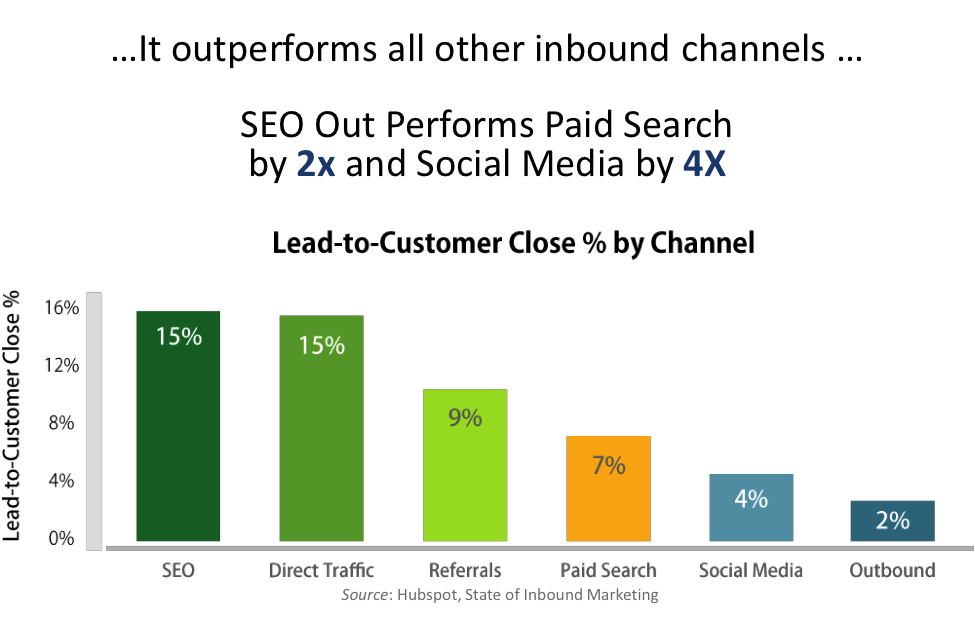SEO (Search Engine Optimization) is the backbone of digital marketing. Regardless of your industry, it’s essential to ensure that your website is optimized to rank well on search engines.
The primary goal of SEO is to increase your website’s visibility and drive traffic to it. However, in recent years, writing content that ranks well on search engines has become increasingly challenging. It is a delicate art that requires a balance between targeting both humans and search engines. The right balance can lead to increased traffic to your website, higher search engine rankings, and more opportunities for sales. However, if not done correctly, it can leave both humans and search engines feeling unfulfilled.
So, although the main objective is to write content that is optimized to rank well on search engines, it is equally important to write content that is human-readable. Why? Because Google’s algorithm prioritizes user experience above all else, and quality content is the cornerstone of a good user experience. Creating quality content means providing your audience with original, insightful, and helpful content that answers their queries.
In this article, we’ll explore how to write SEO content and the benefits and challenges of it for both humans and search engines.
Benefits of SEO Content for Humans:
1. Valuable information
One of the primary benefits of SEO content for humans is that it provides valuable information. It can help readers solve a problem, answer a question, or simply provide entertainment.
2. Engaging
If done correctly, SEO content can be both engaging and useful. High-quality content that engages readers can lead to increased shares, likes, and ultimately, increased website traffic.
3. Builds trust
Providing valuable and engaging content can help your readers view your business as a trusted source of information, and we all know consumers are more likely to do business with companies they feel they can trust.
4. Increases brand awareness
Properly optimized SEO content can increase brand awareness by driving more traffic to your website. The more visible your brand is online, the more likely it is that potential customers will find and choose your business.
Challenges of SEO Content for Humans:
1. Time-consuming
Writing high-quality SEO content that appeals to both humans and search engines can take time. It requires research, planning, and the ability to write content that engages and connects with your target audience.
2. Competition
It’s not just your business that’s utilizing SEO content. Your competitors are also creating content to target the same audience. It’s essential to create content that stands out from the crowd.
3. Requires maintenance
SEO content requires maintenance and updating to remain relevant and effective. This can add additional time and effort in managing and updating website content.
4. Inconsistent results
SEO content is not a magic bullet that guarantees to produce instant results. Depending on various factors, such as your industry, competition, and target audience, it may take time to see consistent results.

Pros of SEO Content for Search Engines:
1. Increased visibility
SEO content helps search engines understand what your website is about and can improve your website’s search engine ranking. The higher your website ranks in search results, the more visible it becomes online.
2. Targeted traffic
Optimizing your website content for specific keywords can attract targeted traffic to your website. This traffic is more likely to convert, as they are already actively searching for the products or services you offer.
3. Long-term strategy
Unlike paid advertising, SEO content can provide long-term benefits. By continuously producing relevant and optimized content, your website can achieve a sustainable position in search results.
4. Cost-effective
SEO content is a cost-effective marketing strategy that can produce significant results over time.
Challenges of SEO Content for Search Engines:
1. Over-optimization
Over-optimizing your website content can lead to penalties from search engines, which can negatively impact your website’s ranking and visibility.
2. Requires consistent effort
SEO content is not a one-time task; it requires consistent effort to maintain and improve your website’s ranking.
3. Algorithms are constantly changing
Search engine algorithms are constantly changing, making it challenging to keep up with SEO trends and best practices.
4. Results can be slow
SEO content is a long-term strategy that can take time to produce results. It requires patience and consistent effort to achieve significant results.
Now that we’ve discussed the pros and cons of SEO content for humans and search engines, it’s time to delve deeper into how to write SEO content.
How to Write SEO Content
The Importance of Keyword Research
Before you start learning how to write SEO content, it’s crucial to conduct keyword research. This process allows you to identify search terms that people use to find information related to your niche. Once you have identified these keywords, you can incorporate them strategically into your content.
There are several tools available to help you identify relevant keywords for your content. However, it is essential to focus on long-tail keywords that are specific to your niche. This is because long-tail keywords are less competitive and have a higher conversion rate.
Writing Compelling Headlines
Your headline is the first thing that users will see when they come across your content. Therefore, it’s essential to ensure that your headlines are both compelling and optimized with keywords. Your headline should provide users with a clear idea of what they can expect to find in your content.
One way to write compelling headlines is to use emotional triggers. These triggers are designed to tap into the emotions of your audience and encourage them to read your content. For example, including words such as “surprising, “shocking,” or “jaw-dropping” in your headlines can pique the interest of your audience. That being said, avoid falling into clickbait as most people find it annoying.
Writing Valuable Content
It’s crucial to write content that provides value to your audience. This is because search engines prioritize value and relevance when ranking content. If your content is valuable, it’s more likely to rank well on search engines.
One simple way to add value to your content is to answer the questions that your audience may have. This can be achieved by conducting research or seeking feedback from your audience. You can also include actionable tips that help readers solve specific problems.
Optimizing Your Content for Search Engines
After writing valuable content that resonates with your human audience, it’s time to optimize it for search engines. There are several things to consider when it comes to optimizing your content:
Keywords:
Ensure that your keywords are strategically placed throughout your content. This includes your headlines, subheadings, and body text. However, keep in mind keyword stuffing is a no-no in SEO. Focus on writing natural and conversational content that includes your targeted keywords. But If it sounds awkward, it probably is.
Meta Descriptions:
Write a compelling meta description that includes your primary keyword. This is the short snippet that appears under your headline on search engine results pages.
Alt Text:
Ensure that all images on your website include descriptive alt text that contains your relevant keywords.
The Importance of Visuals
Visuals considerably impact the user experience. Integrating visuals, such as images, infographics, and videos, can help in delivering information to your audience effectively. Engaging visuals and well-placed graphics can also help break up large blocks of text, making your content more appealing and enticing to your readers.
Visual content like images and infographics help in providing a visual representation of information, too, making it easier for your audience to understand your content. Consider hiring a graphic designer to create custom visuals that match your brand, as this can significantly improve the user experience.
Link-Building and Internal Linking
Link-building and internal linking are two essential components of how to write SEO content, as they help establish your site’s authority and improve its search engine ranking. Link building involves creating high-quality links to external pages, while internal linking involves linking to other pages within your site.
External links demonstrate your site’s authority and relevance. When creating external links, ensure that you link to credible and authoritative sources. This helps improve your site’s reputation and ranking in the search engine results pages.
Internal linking helps to provide an efficient user experience. Consider linking to other pages within your site that offer related content. This helps keep your users on your site for longer and can ultimately improve your site’s ranking.
Mobile Optimization
Mobile optimization is another critical component of SEO content writing. With the increasing use of smartphones and tablets, mobile usage has overtaken desktop usage. This indicates that your content should be optimized for mobile devices.
This means that your site should be designed to load quickly on mobile devices, adapt to different screen sizes, and be easy to navigate on their mobile devices.
Proofreading and Editing
Proofreading and editing are crucial in SEO content writing. Your content should be free of spelling errors, grammatical mistakes, and formatting issues. These can be a turnoff for your audience and lower your rankings in search engine results pages.
Take the time to review and edit your content carefully before publishing it. It’s also a good idea to have someone else proofread it as well, as they may catch errors that you missed.
Promoting Your Content
Creating quality content is only half the battle. You also need to promote your content effectively to reach your audience. Share your content on social media channels and other relevant sites to attract more traffic and build links to your site.
Guest blogging is a great way to reach new audiences and build links to your site. Look for relevant blogs in your niche and offer to create high-quality content in exchange for a link back to your site.
You can also use email marketing to promote your content to your existing audience. Send out a weekly or monthly newsletter that includes links to your most recent content and other relevant information that your subscribers might find valuable.

5 Best Practices to Write SEO Content:
1. Research
A good SEO content writing service should conduct thorough research to understand your business, competitors, and target audience.
2. Quality writing
The content produced by SEO content writing services should be high-quality, engaging, and informative. The content should speak to your target audience and provide value to them.
3. Authenticity
The content should reflect the voice and tone of your business. Avoid generic and robotic writing that doesn’t connect with your audience.
4. Optimize formatting
Proper formatting, the use of header tags, and internal and external linking are all essential for SEO-friendly content.
5. Keep it fresh
Good SEO content writing services should keep your website updated with new and relevant content.
Conclusion
So, how to write SEO content?
SEO content writing is both an art and a science. It requires a combination of creativity, strategic thinking, and technical skills to create content that resonates with your audience and ranks well with search engines.
By following these strategies and keeping up with the latest trends in SEO content writing, you can improve your rankings, drive more traffic to your site, and ultimately grow your business. If you’re looking for a professional SEO content writing service to help you create quality content that’s optimized for both humans and search engines, consider outsourcing to a trusted provider that can help you achieve your goals.
At SEOArmy we are passionate about SEO. Our team is composed of SEO experts and strategists who can help you with every aspect of your SEO journey. Book a call with us today, we would love to hear from you!




